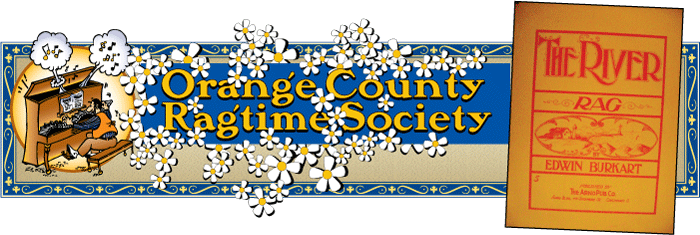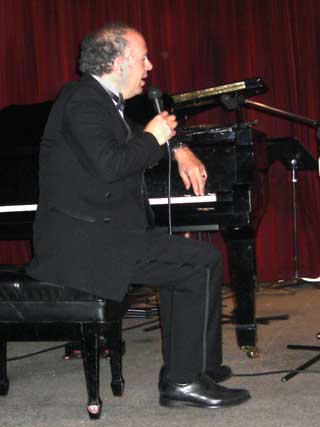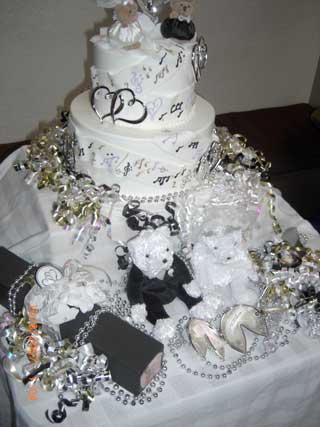October 2012 OCRS focus
is Joplin, Eubie Blake and jazz – and celebrates Bob Pinsker’s
recent marriage
Nine pianists assembled on a cloudy, muggy
October afternoon at Steamers to perform nearly three-dozen selections.
The favored composers included Joplin and Eubie Blake and the material
a good deal of non-ragtime – but the real purpose of the day
was to celebrate longtime OCRS member Bob Pinsker’s recent marriage
to Lisa Richardson, which included a beautiful (and delicious) wedding
cake and a recounting of how the two first met at Steamers in September
of 2002 at one of the earliest OCRS performances.
As the audience filed in, Bob, looking spiffy in a tux, rolled out
at least a half-dozen spectacular Stride tunes, including Blake’s
“Blue Thoughts,” Jimmy Blythe’s “Sugar Dew
Blues,” and Willie the Lion Smith’s “Lament of the
Lioness.” Gary Rametta then essayed Trebor Tichenor’s
“It’s a Long Way Back Home” (1966) and Bix Beiderbecke’s
“Flashes,” which was published posthumously in 1931, based
on a transcription made by Bill Challis in the 1920s. Gary closed
his set with a solid and lively rendition of DTR’s “Waterloo
Girls” before ceding the stage to MC Eric Marchese, who got
things started with Joplin’s “Eugenia,” noting its
title’s dual origins (Eugenia Street in the old tenderloin district
of St. Louis and the eugenia bushes depicted on the rag’s cover).
Shirley Case delivered a Eubie Blake-themed set, starting with Eubie’s
advanced, intricate and wholly enthralling “Eubie’s Classical
Rag.” Next was “Baltimore Rag,” Galen Wilkes’
tribute celebrating Blake’s centennial and tipping its hat to
his hometown. Shirley ended with “Proctology,” a whimsical,
bluesy and humorously low-key rag written by Blake protégé
Terry Waldo in the 1970s.
Gary Rametta delivered an expressive, emotional rendering of “In
the Dark,” Bix Beiderbecke’s slow, introspective jazz
piano solo, published posthumously in 1931. Gary then followed up
with a sensitive rendering of the poignant “Roberto Clemente,”
one of David Thomas Roberts’ most famous (if not the most famous)
compositions written in 1979, six years after the tragic death of
the humanitarian baseball player.
Ryan Wishner opened his set with Louis Moreau Gottschalk’s 1846
opus “Bamboula,” noting that the piece is “not really
ragtime” and delivering us the “short version,”
as the complete score far exceeds the length of a typical OCRS selection.
The piece, written when its composer was still in his teens, has definite
links to the American pop music of 50 to 60 years later. Perhaps more
demanding than most ragtime, it is definitely a concert showpiece
given a wonderful rendering by pianist Ryan. Next up: “Anoma,”
perhaps the most intricate and demanding of Ford Dabney’s handful
of published rags. Ryan learned this arrangement from a recording,
and the piece is a thrill to hear and to see being performed. Ryan
closed with a creative, wonderfully raggy arrangement of the 1908
standard “Shine On, Harvest Moon,” written by Nora Bayes
and Jack Norworth and interpolated into the Ziegfeld Follies of 1908.
(FYI, upon his retirement, Norworth moved to Orange County, living
in Laguna, and is buried in Anaheim.)
Ron Ross gave us two pieces from his “Ragtime Renaissance”
CD: “Sunday Serendipity” and “Joplinesque –
A Gringo Tango.” Both feature many minor-key passages, and in
“Joplinesque” Ron adds a habañera rhythm to the
mix. Ron closed with one of his many comic songs, singing and playing
“Afternoon TV,” which satirizes soap opera clichés
in lines like “preverts parading across my TV set.”
Bill Mitchell delivered a Dixieland-style rendition of “The
Strenuous Life,” one of Joplin’s many fine pieces published
in 1902, and one of a handful of the composer’s rags which for
whatever reason aren’t frequently performed. (To that list,
your reporter adds the following Joplin rags: “The Favorite,”
“A Breeze From Alabama,” “Cleopha,” “The
Sycamore,” “Leola,” “Eugenia,” “Country
Club,” “Euphonic Sounds,” “Stoptime Rag”
and the complete, nine-page score of “The Ragtime Dance”
as well as many of Joplin’s non-ragtime waltzes and marches.)
Bill’s rendition of the 1909 hit “Apple Jack,” subtitled
“Some Rag,” was a swingy treatment of this fine Charles
L. Johnson tune. Bill closed his set with “Baltimore Todalo,”
Eubie Blake’s iconic piece commemmorating his hometown and showcasing
many of his characteristic compositional devices.
Tongue planted firmly in cheek, Robert Wendt took to the stage and
stated, “Let me be the first to wish you a Merry Christmas,”
then offered Lamb’s charming “Reindeer Rag” (1915),
essaying the closing theme in octaves. Up next was Wilkes’ signature
1983 rag “Creeks of Missouri,” which Robert plays in dreamlike
fashion before tacking a final reiteration of the A theme onto the
piece’s conclusion. Robert closed with the second of the afternoon’s
three 1902 Joplin rags – “Elite Syncopations,” a
favorite of Robert’s to which he lends a measured pace before
adding pep to the closing theme’s syncopations described by
publisher John Stark as “frenzied.”
Norm Zix gave us four selections, the first three in waltz tempo.
He opened with Randy Newman’s haunting, music box-like “One
More Hour,” the theme piece to the 1981 film version of E.L.
Doctorow’s novel “Ragtime.” Next was the 1963 jazz
waltz “Bluesette,” a familiar tune and, like the Newman
piece, a pretty instrumental waltz. As familiar-sounding is Fats Waller’s
“Jitterbug Waltz” of 1942, given an outstanding treatment
by Norm, who closed with Willie The Lion Smith’s iconic “Finger
Buster,” issued by the Clarence Williams Music Publishing Company
of New York in 1934.
Noting that it was nearly time for the break, the raffle, and the
Bob and Lisa celebration, Eric stated that while he hadn’t dedicated
any of his rags to the couple, he did want to dedicate his performance
of his 1994 piece “A Sunset Idyll” to them, hoping their
marriage is as idyllic as what’s communicated in this piano
rag. Tender and often poignant, its finale speaks of the intense introspection
of the earlier themes wedded to a quiet sense of triumph.
Bob Pinsker then took the stage and recounted the story of how his
collecting and arranging of piano rolls led him to purchase a set
of piano rolls from Lisa Richardson on eBay. After learning that Lisa
was selling some of her mother’s rolls (in an effort to reduce
the collection from several thousand rolls to ‘only’ a
couple thousand!), Bob suggested that both Lisa and her mother Maggie
attend the September 2002 OCRS performance, as it was after all only
a few miles from their home – and anybody interested in piano
rolls of the teens and twenties would likely find the OCRS fare of
interest. They did attend and enjoy the meet. On the spur of the moment,
Maggie invited the whole crowd over to the Richardson house for a
‘afterglow’ party that evening. Bob and Lisa hit it off,
and have been together ever since.
Since on that date a decade ago Bob performed a whole set of tunes
by Spencer Williams (see the
September 2002 OCRS write-up), he opened with the verse and chorus
of Williams’ “Trix Ain’t Walkin’ No More,”
a 1919 opus co-composed with Clarence Williams. The piece is a real
handful of keys given even more generous filling out by Bob, especially
on the pianistic chorus. Next up, from the same year, “Shim-Me
She-Wabble,” a taxing and demanding number whose opening themes
(the song’s verse and an extension from the published orchestral
arrangement) use minor tonalities to effect a “sinister”
sound and whose wonderful chorus captures the essence of Chicago in
the teens. Next was Alex Hill’s 1935 arrangement of Spencer
Williams’ sweet, lively “Basin Street Blues.” One
chorus of Hill’s arrangement uses the Charleston rhythm, and
the out chorus is genuinely hot and low-down.
Lisa Pinsker took the mic and gave her recounting of her and Bob’s
first meeting, saying it was prefaced by numerous “Bob Pinskers”
to surface in her internet search to find out more about Bob before
meeting him. One Bob Pinsker was a mountaineer. Another was a scientist.
Yet another was a performer, arranger and researcher of the Stride
and east coast pop music of the 1920s and ’30s. To her eventual
surprise and delight, Lisa soon realized they were all one and the
same person, saying that Bob is her “personal jukebox,”
obliging her with whatever she wishes to hear on the piano, whether
Chopin or The Beatles or the music of the Harlem Renaissance. She
said the couple “knew that if we could make it 10 years”
before getting married, they knew they could stay married for much
longer than 10 years. The piano roll that helped bring them together
was Max Kortlander’s great, raggy arrangement of “You
Got to See Mama Ev’ry Night Or You Can’t See Mama At All”
(QRS 2175, issued April 1923). In a tribute to Kortlander’s
roll, Bob delivered an incredible performance which ultimately breaks
into a double-time one-step for a rousing final chorus.
We entered the break admiring the beautiful, music-motif decorated
cake before Lisa sliced it up and served it to all. Photos of the
couple followed, then a warm and enjoyable interaction between Bob
and Lisa and their many friends and guests. The raffle included some
of Bill Mitchell’s great ragtime LPs of the 1970s and a recent
CD by Mitch Meador in which great pop music from Oklahoma during the
ragtime era has been digitally orchestrated.
As that collection includes several selections by H. Clarence Woods,
Eric kicked off the encore portion of the program by playing Woods’
“Slippery Elm Rag.” The piece turned 100 this year, and
Eric noted that its chromaticism not only involves both treble and
bass parts, but also contributes an ethereal quality heard often in
the composer’s music, whether ragtime or of other genres. Eric
then performed his newest piano rag. Titled “The Ragtime Utopia,”
it’s an homage to the ragtime community at large and to that
of Southern California in particular, with a riff-like, driving closing
strain featuring blues harmonies and a countermelody, in octaves,
in the bass.
Heading out for a gig, Gary delivered a slow, meditative performance
of Duke Ellington’s “Reflections in D.”
Bill gave us “The Pearls,” one of his favorite Jelly Roll
Morton pieces and one of his best solos, a pleasing and pleasant interpretation
of this Morton classic given a nice, easy tempo.
Robert graced us with “The Entertainer,” the third and
final 1902 Joplin rag of the afternoon, closing his performance of
it with the piece’s hallmark A theme.
Norm created a beautiful medley of “Spring Is Here” and
“Stella By Starlight.”
Ryan encored with William Krell’s “Mississippi Rag.”
Despite the fact that the 1897 piece is a cakewalk, as Ryan notes,
and not “the first rag ever” (as it had been billed),
it’s still a justly famous composition, a typical “patrol”
that starts out triple piano, rises in volume toward its middle, then
gradually drops in volume as it reaches its soft, fading ppp
finale.
Guest of Honor Bob Pinsker took us out of the day with “Charleston
Rag.” Eubie’s sensational iconic piano piece features
many of his hallmarks, licks and trick – the wobbly, sinister-sounding
bass, the tour-de-force trio intro and wild, often descending trio,
the great, original upward arpeggio, the rich, Harlem-esque harmonies,
and much more. Bob went to town on the piece and, in the process,
blew the roof off of Steamers and sent everyone off smiling.
Eric noted that we would not only be here again in three weeks for
the next OCRS (Saturday, November 10), but that we would re-convene
in Fullerton in September of the year 2022 to celebrate Bob and Lisa’s
10th wedding anniversary (!!)



